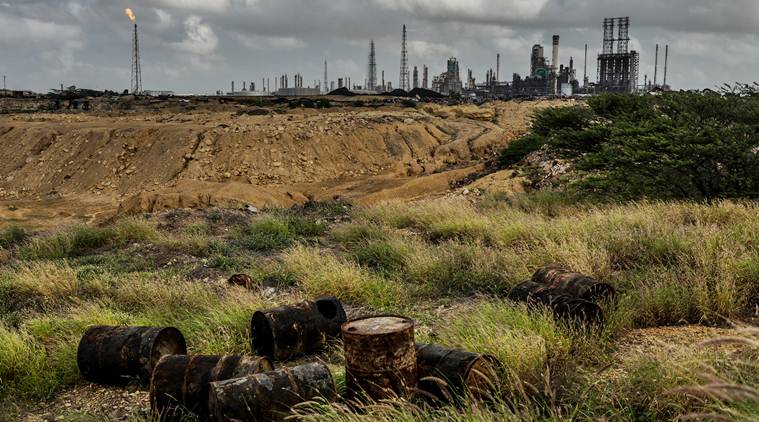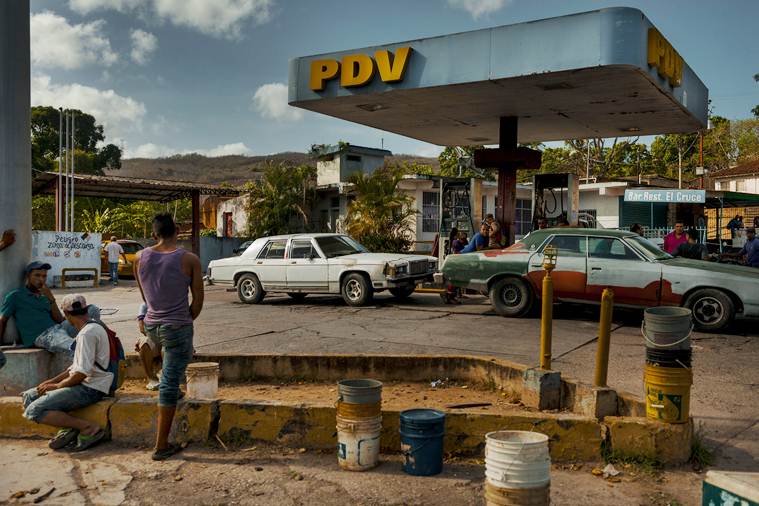 FILE — The sprawling refinery in Los Taques, near Amuay, Venezuela, Dec. 7, 2017. (Meridith Kohut/The New York Times)
FILE — The sprawling refinery in Los Taques, near Amuay, Venezuela, Dec. 7, 2017. (Meridith Kohut/The New York Times)
Written by Anatoly Kurmanaev and Clifford Krauss
After decades of dominating its oil industry, the Venezuelan government is quietly surrendering control to foreign companies in a desperate bid to keep the economy afloat and hold onto power.
The opening is a startling reversal for Venezuela, breaking decades of state command over its crude reserves, the world’s biggest. The government’s power and legitimacy has always rested on its ability to control its oil fields — the backbone of the country’s economy — and use their profits for the benefit of its people. But the nation’s authoritarian leader, Nicolás Maduro, in his struggle to retain his grip over a country in its seventh year of a crippling economic crisis, is giving up policies that once were central to its socialist-inspired revolution.
Under Venezuelan law, the state-run oil company must be the principal stakeholder in all major oil projects. But as that company, Petróleos de Venezuela, or PDVSA, unravels — under the weight of U.S. sanctions, years of gross mismanagement and corruption — the work is unofficially being picked up by its foreign partners.
Private companies are pumping crude, arranging exports, paying workers, buying equipment and even hiring security squads to protect their operations in a collapsing countryside, according to managers and oil consultants working on the country’s energy projects.
In effect, a stealth privatization is taking place, said Rafael Ramírez, who ran Venezuela’s oil industry for more than a decade before breaking with Maduro in 2017, in a video address this week. “Today, PDVSA doesn’t manage our oil industry. Venezuelans don’t manage it,” said Ramírez. “In the middle of the chaos generated by the worst economic crisis suffered by the country in its history, Maduro is taking actions to cede, transfer and hand over oil operations to private capital.”
PDVSA did not respond to requests for comment on its recent concessions to private partners.
 FILE — Drivers line up at a Petróleos de Venezuela gas station in Carupano, Venezuela on June 12, 2019. The company, once a dominant presence in the country’s oil fields, is unraveling. (Adriana Loureiro Fernandez/The New York Times)
FILE — Drivers line up at a Petróleos de Venezuela gas station in Carupano, Venezuela on June 12, 2019. The company, once a dominant presence in the country’s oil fields, is unraveling. (Adriana Loureiro Fernandez/The New York Times)
The haphazard changes to the oil sector, which have accelerated in recent months, are remaking the oil industry in a nation whose assertive energy policies had, since the 1950s, served as an example to developing countries of how to take control of natural resources. And they are a stark retreat from the vision of Hugo Chávez, who was Maduro’s mentor and predecessor. Chávez nationalized in 2007 the giant holdings of Exxon Mobil and ConocoPhillips and packed PDVSA’s leadership ranks with political allies dedicated to his socialist-inspired “Bolivarian revolution.”
But Maduro’s transformation of Venezuela’s oil industry has stemmed the collapse triggered by a U.S. embargo. Sanctions imposed in January 2019 had wiped out about one-third of Venezuela’s oil production, bringing it down at one point to the lowest level since the 1940s, according to data from OPEC.
Oil production now is still less than one-third of the total in 1998, when Chávez took power. By late 2019, Venezuela had stabilized exports at about 1 million barrels per day, according to Bloomberg’s tanker-tracking data. The dribble of oil exports has provided Maduro with foreign revenue at the most critical moment of the country’s economic crisis, allowing him to adjust to sanctions and consolidate his rule.
In the country’s main oil export hub, José, key processing plants and piers are slowly coming to life after near-total paralysis in the summer, when PDVSA was cut off from the global financial system and struggling to cope without its biggest market, the United States, according to shipping agents and oil managers.
The unofficial, partial privatizations of the past year have been led by an unlikely reformer: Manuel Quevedo, a National Guard general with no known oil experience who was appointed by Maduro to head PDVSA.
Quevedo broke with the nationalist rhetoric of his predecessors to hand over operational control of joint oil projects to partners that include Chevron; Russia’s state-run company, Rosneft; some European and Chinese companies; and groups of Venezuelan magnates.
“With PDVSA in crisis mode, they are increasingly handing operational responsibilities and decisions over to the partners,” said Lisa Viscidi, a specialist in Latin American energy issues at Inter-American Dialogue, a Washington-based research group.
The concessions are gradually reducing PDVSA to little more than a holding company collecting the state’s share of oil field revenues, with most financial and strategic decisions taken by private partners. This is a startling decline from just a decade ago, when PDVSA was the pride of Venezuela and the cornerstone of its economy.
Until the start of the economic crisis in 2013, the company was the source of virtually all of Venezuela’s hard currency. It was also its biggest employer and penetrated all aspects of life in the country, running everything from supermarkets to parks. Today, oil fields wholly owned by PDVSA account for less than half the nation’s remaining oil production, and their output continues to plummet.
On the export side, PDVSA’s biggest ally has been Russia’s Rosneft, which over the past year has grown to sell about two-thirds of Venezuela’s oil. Rosneft has quickly replaced PDVSA’s U.S. sales routes by diverting its oil to Asia, often obscuring the cargo’s source and destination to bypass sanctions, according to companies that monitor tanker traffic.
Barred from the global financial system, PDVSA has also been forced to cede control to foreign partners in organizing exports, which goes against the country’s energy laws. Over the past few months, Chevron, Rosneft and Italy’s Eni have all directly exported Venezuelan crude.
PDVSA’s opening of exports — oil cargoes worth millions of dollars — to anyone who can bypass sanctions to line up a vessel, insurance and a customer for the crude has even created a small cottage industry among Venezuela’s elite.
Now the only thing that matters is that oil continues to flow, said one partner at a joint oil venture as he scanned his phone, viewing the state company’s cargo offers.
“The historical struggle for resource sovereignty is being sacrificed for operational expediency,” said Antero Alvarado, an energy consultant in Caracas.